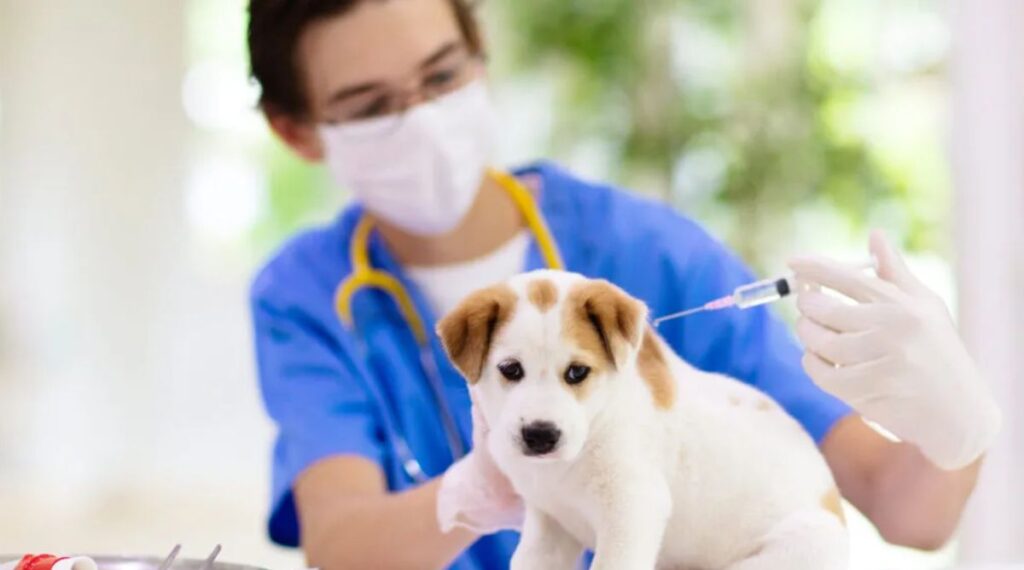It is pertinent for everyone to know that the combination dog vaccination, also referred to as the DHPP Vaccination for Dogs, is critical for the well-being of your dog. This vaccination, among other similar ones, protects your dog against the most dangerous and life-threatening diseases, including dog distemper, hepatitis, parvo, and parainfluenza.
The latter-mentioned diseases are devastating for pets. Vaccination called DHPP Vaccination for Dogs is all-encompassing in that it does indeed vaccinate for these diseases. Most vaccines worldwide are administered in the early stages of life, which is no exception.
This article seeks to explore the details of the vaccination process and peripheral issues surrounding it. By the end, readers will understand the extent to which DHPP Vaccination for Dogs is important.
What Is This DHPP Dog Vaccine All About?
For dog owners, this polemic question can be addressed straightforwardly. The DHPP Vaccination for Dogs is core for every dog, and for this reason, it is very important.
Regardless of the dog’s age or living conditions, the vaccination is advisable. Core vaccines are all the immunizations that require action to avoid the most reoccurring and life-threatening infections that tremendously endanger your dog’s life. This includes the DHPP vaccine, which is a singular vaccine and can be used to prevent numerous diseases, such as:
Distemper virus (D): This viral infection is an epidemic and affects several body systems of the dog, including the respiratory, digestive, and, in some instances, even the nervous system. Notable symptoms are coughing, fever, vomiting, diarrhea, and other neurological dysfunctions. It is exceptionally perilous for puppies and elderly dogs with weakened immune systems, as it can turn out to be life-threatening.
On the other hand, canine adenovirus CAV-1 and CAV-2: This category of adenoviruses is responsible for infectious canine hepatitis that is highly detrimental to the liver if not treated immediately.
Such canine hepatitis caused by adenoviruses may result in fever, stomach ache, and vomiting. CAV-2 is called the king of the cough potenti, which is very dangerous as it tends to lower the dog’s immunizing strength, which is even more hazardous.
Canine parainfluenza (P): This wasp refers to kennel cough, a widespread respiratory infection that is viral in origin. It causes a forceful, persuasive cough.
A dog can become lethargic, cough, and have nasal discharge.
Parvo (P): This is perhaps one of the most dangerous and even life-threatening diseases that plague mainly puppies.
It affects the intestines, resulting in extensive vomiting, diarrhea, and severe dehydration. Puppies can get very sick from unimmunized dogs, as the sickness can spread quite easily. Parvo tends to be very resilient. Once it gets on a surface, it can be there much longer and is quite simple to catch.
Why is The DHPP Vaccine Important for dogs?
There are several factors to consider when considering why this DHPP Vaccination for Dogs is essential.
Prevention of Serious Illnesses: The DHPP vaccine has been designed to prevent serious illnesses, which are often life-threatening. Vaccination is the only solution to avoid these illnesses, for once a vaccine is contracted, no treatment can rectify the situation.
Safeguarding Public Health: A dog’s immunization guarantees that all other dogs in the neighborhood, including friends, relatives, and others, are not put at risk. If a majority of people vaccinate their dogs, herd immunity will be obtained, which will cut down the prevalence of these infections.
Reducing Treatment Cost: These infections are very expensive to treat, unlike getting a vaccine, which is comparatively much cheaper. Eliminating costly veterinarian treatments will allow pet owners to save on costs in the long run.
Boarding and Legal Regulations: Although the DHPP vaccine is not a legal obligation in many sections, vaccination proof is still required at boarding centers, pet parks, and grooming shops. So long as the DHPP vaccine is administered regularly, one can participate in those activities.
Vaccination Schedule
The first in the series DHPP Vaccination for Dogs is usually given between 12 and 16 weeks and is effective if administered by 6 to 8 weeks. Below is a general schedule of when to get the DHPP vaccine:
First Dose of DHPP vaccine: 6 to 8 weeks
Second Dose of DHPP vaccine: 10 to 12 weeks
Third Dose of DHPP vaccine: 14 to 16 weeks
First booster shot after the initial series: 1 year
Additional booster shots are recommended for your dog’s health every 1-3 years. Please consult your veterinarian for more details and follow their schedule along with the vaccine sponsor’s schedule.
Completing the vaccination series is advisable to avoid harm to your dog. Follow this timeline as carefully as possible because the puppy phase is essential to any dog’s health and development.
Benefits of the DHPP Vaccination for Dogs
The DHPP Vaccination for Dogs is very beneficial for dogs.
Complete Protection: It is easy for a dog owner to get complete protection from a number of deadly diseases with only one DHPP Vaccination for Dogs.
Less Stress for Your Dog: Having fewer shots means your dog will be less stressed when visiting the vet, which makes this experience more pleasant for you both.
Time Conservation: With the combined DHPP Vaccination for Dogs, there is no need to book individual appointments for each vaccine, saving you time.
Mental Clarity: Knowing that your dog is protected from these serious health complications allows you to relax as an owner.
Potential Side Effects
Most dogs cope well with the DHPP Vaccination for Dogs, but, like any other vaccination, certain dogs may encounter some mild side effects, such as:
Fever with a temperature no higher than 103F Soreness or swelling in the area of the injection Loss of appetite Lethargy
These DHPP dog side effects are not severe and should resolve after a few days at most. However, in some cases, the vaccination can trigger serious side effects, including swelling around the face, difficulty breathing, a severe drop in blood pressure, or loss of consciousness. If any dog shows such signs, it is best to seek veterinary assistance immediately.
Prior Attention To Vaccine Side Effects
As a good pet owner, it is your responsibility to be aware of any side effects that may occur to your pet.
Some side effects could occur with the DHPP Vaccination for Dogs, like restlessness or aggression that is a bit extreme. However, instead of paying more attention to the mentioned symptoms, it is always best to contact a veterinarian in case of the following scenarios:
Uncontrollable Emesis Or Prolonged Obstinacy: Extreme lethargy or waning signs accompanied by no recovery of any sort
Eye And Face Puffiness: The Airway functions with imbalances, making relaxation quite hard
Some of the signs listed above should be taken seriously, and it is not a bad idea to trust a vet.
The Importance Of Appointment Scheduling With The Clinic For Pets
Regular checkups with a veterinarian ensure proper health for the dog and the timely delivery of essential vaccines. These appointments cover everything that your dog has advanced in your practice, including its state of health and every one of its specific problems, with the concern of additional vaccinations needed.
Conclusion: DHPP Vaccination for Dogs
It prevents your canine friend from suffering from distemper, hepatitis, parainfluenza, or parvovirus and from having an ordinary existence. Your caring attitude towards the dog will ensure that it follows the dog vaccination schedule and other health requirements, which increases the chance of a healthier life for the dog.
The pet owner is responsible for ensuring that their pet dog receives the right medical treatment, including proper checkups and timely vaccines, to provide a longer life for the pet. One crucial DHPP Vaccination for Dogs. Neglecting the dog’s vet visit is not an option. Regular checkups and vaccines are vital for your pet.
FAQs: DHPP Vaccination for Dogs
Does Using Dhpp Vaccine for Dogs Is A Must?
Just like any other activity, nothing is stopped. However, not using it comes with significant risk in this case, so seeking veterinary attention would not be bad.
As A Dog Owner, How Often Are Dogs Supposed To Have The Dhpp Vaccines?
Depending on your dog’s needs, your veterinarian may recommend boosters every one to three years after the initial rounds taken as a puppy.
Will A Dog Suffer Side Effects From The Dhpp Vaccine?
Some dogs may experience mild soreness, headache, fever, or fatigue, which are possible side effects of the vaccine. In rare cases, however, severe reactions may occur.
What Do I Do If My Dog Reacts Severely To The Dhpp?
If your dog shows symptoms of an allergic reaction—swelling or rashes on the face plus breathing difficulty—seek your vet’s advice immediately.
Can My Dog Still Catch Those Diseases After Getting The Shots?
The DHPP vaccine dramatically decreases the odds of your dog contracting the illness. However, it is essential to highlight that we do not have a single vaccine that works 100 percent of the time.







